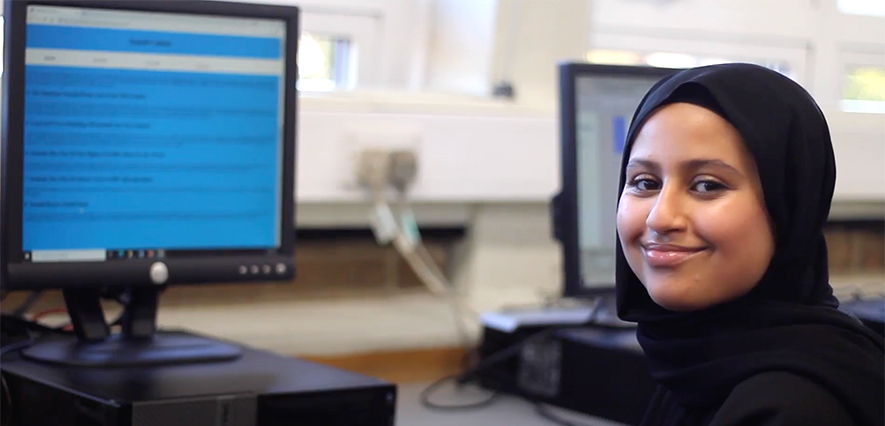A Year 10 Student at Queens Park Community School, London.
Photo: Polly Card.
Department of Computer Science and Technology

Submitted by Rachel Gardner on Thu, 27/01/2022 - 10:00
The Roots project builds on work already conducted by the Raspberry Pi Foundation to help us understand how to make computing accessible to all young people and how to engage more under-represented groups in computing.
"We know that in computing careers and qualifications, there are a number of different groups in society – including certain ethnic minorities, and females – that are really under-represented," says Dr Hayley Leonard, Research Scientist at the Raspberry Pi Foundation. "Culturally relevant pedagogy is a way of trying to engage these different groups, make computing feel relevant to them, and make them feel like they belong to computing as a discipline."
According to The Roehampton annual computing education report, in England in 2017 black students made up only 4.2% of GCSE computer science students and 3.3% at A level, despite accounting for more than 5% of the population. Female students in the same cohort represented only 20% of GCSE computer science students and 10% at A level.
We're really excited that we can now focus on how culturally responsive computing teaching can be implemented in English schools through the Roots project.
Dr Sue Sentance
In 2021, funded by a Special Projects Grant from ACM’s Special Interest Group in Computer Science Education (SIGCSE), the Foundation established a working group of teachers and academics who met up over the course of three months to explore and discuss culturally relevant pedagogy.
The result was a collaboratively written set of practical guidelines about culturally relevant and responsive teaching for classroom educators. It identifies a range of teaching practices that can be implemented in the classroom, including:
"We're really excited that, having developed these guidelines, we can now focus on how culturally responsive computing teaching can be implemented in English schools through the Roots project,"says Dr Sue Sentance, Director of the Raspberry Pi Computing Education Research Centre and Chief Learning Officer at the Raspberry Pi Foundation. "It’s a great privilege to lead this work."
The pilot phase of the project starts this month. During the pilot, researchers will work with a small group of schools around London, Essex, and Cambridgeshire and two workshops will be held in these schools.
In the first workshop, teachers will work together with facilitators from the Foundation and the Raspberry Pi Computing Education Research Centre to discuss culturally responsive computing teaching and how to make use of the guidelines in adapting existing lessons and programmes of study.
A second workshop will take place after the teachers have implemented the guidelines in their classroom, and it will be structured around a discussion of the teachers’ experiences and suggestions for iteration of the guidelines.
The Roots researchers will also be using a visual research methodology to create a number of videos representing the new knowledge gleaned from all participants’ experiences of the project. The results of the project will be shared later on in the year.
Dr Polly Card will be leading the work at the Raspberry Pi Computing Education Research Centre here – and will be talking about it at our Education Research Showcase which takes place this afternoon, Thursday 27 January.
She will be working collaboration with Saman Rizvi in the Foundation’s research team and Katie Vanderpere-Brown, Assistant Headteacher, Saffron Walden County High School, Essex and Computing Lead of the NCCE London, Hertfordshire and Essex Computing Hub.